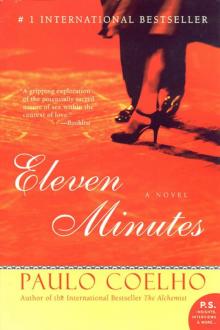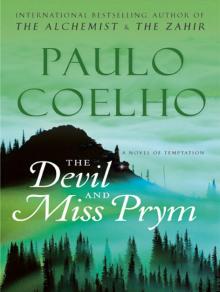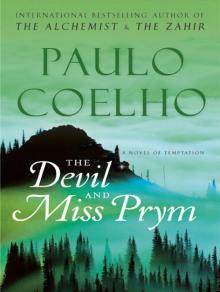- Home
- Paulo Coelho
Brida: A Novel Page 5
Brida: A Novel Read online
Page 5
"I need to take risks. I need to feel the fear of failing," she thought as she opened the book. As soon as she glanced at the pages, she began to feel ill and dizzy again.
"I'm going to faint," she managed to think before everything went dark.
She woke with water dripping on her face. She'd had a strange, incomprehensible dream about cathedrals floating in the air and libraries crammed with books. And yet she had never been in a library.
"Loni, are you all right?"
No, she wasn't. She couldn't feel her right foot, and she knew this was a bad sign. She didn't feel like talking either, because she didn't want to forget the dream.
"Loni, wake up."
She must be feverish, delirious, and yet what she saw in her delirium seemed so intensely real. She wished the person who kept calling to her would stop, because the dream was now fast disappearing before she had managed to grasp its meaning.
The sky was cloudy, and the clouds were so low they almost touched the castle's tallest tower. She lay looking up at the clouds. It was just as well she couldn't see the stars; according to the priests, not even the stars were entirely good.
The rain had stopped shortly before she opened her eyes. Loni was pleased it had rained, for that meant the castle's water butts would be full. She slowly shifted her gaze from the clouds to the tower, to the bonfires in the courtyard and the bewildered crowds of people milling around.
"Talbo," she said softly.
He put his arms around her. She felt the cold of his armor and the smell of soot in his hair.
"How much time has passed? What day is it?"
"You've been asleep for three days," said Talbo.
She looked at Talbo and felt sorry for him. He was thinner, his face grimy, his skin dull. Not that any of this mattered--she loved him.
"I'm thirsty, Talbo."
"There's no water. The French found the secret passageway."
Again she heard the Voices inside her head. For a long time, she had hated those Voices. Her husband was a warrior, a mercenary, who spent most of the year away fighting, and she had always been afraid that the Voices would tell her that he had died in battle. She had found a way of keeping the Voices from speaking to her. She just had to concentrate her mind on an ancient tree near her village. The Voices stopped when she did that. Now, however, she was too weak, and the Voices had returned.
"You're going to die," said the Voices. "But he will be saved."
"But it rained, Talbo," she said. "I need water."
"It was only a few drops. Nothing like enough."
Loni again looked up at the clouds. They had been there all week, and had done nothing but block the sun, making the winter even colder and the castle even gloomier. Perhaps the French Catholics were right. Perhaps God was on their side.
A few mercenaries came over to them. Fires were burning everywhere, and Loni had the sudden feeling that she was in hell.
"The priests are gathering everyone together, sir," one of them said to Talbo.
"We were hired to fight, not to die," said another.
"The French have offered us terms of surrender," replied Talbo. "They say that those who convert back to the Catholic faith can leave unharmed."
"The Perfect Ones will not accept," the Voices whispered to Loni. She knew that. She knew the Perfect Ones well. They were the reason she was there and not at home, where she usually waited for Talbo to return from battle. The Perfect Ones had been besieged in that castle for four months, and during that time, the village women had used the secret passageway connecting village and castle to bring in food, clothes, and ammunition; during that time, they had been able to see their husbands, and it was because of them that the fighting had continued. Now, however, the secret passage had been discovered, and she could not go back to the village, nor could any of the other women.
She tried to sit up. Her foot didn't hurt anymore. The Voices were telling her that this was a bad sign.
"We have nothing to do with their God. We're not going to die over that, sir," said another soldier.
A gong began to sound inside the castle. Talbo got to his feet.
"Please, take me with you," she implored. Talbo looked at his companions and then at the woman who lay trembling before him. For a moment, he didn't know what to do. His men were accustomed to war, and they knew that warriors who were in love usually hid during battles.
"I'm going to die, Talbo. Take me with you, please."
One of the mercenaries glanced at Talbo.
"She shouldn't be left here alone," he said. "The French might start firing again."
Talbo pretended to agree. He knew that the French would do no such thing. A truce had been called in order to negotiate the surrender of Monsegur. But the mercenary understood what was going on in Talbo's heart; he, too, must be a man in love.
"He knows you're going to die," the Voices said to Loni while Talbo gently picked her up. Loni didn't want to listen to what the Voices were saying; she was remembering a day when they'd walked along together just like that, through a wheat field, on a summer afternoon. She had been thirsty then as well, and they had drunk water from a mountain stream.
A crowd of men, soldiers, women, and children were gathered round the great rock that formed part of the western wall of the fortress of Monsegur. An oppressive silence hung in the air, and Loni knew that this was not out of respect for the priests, but out of fear for what might happen.
The priests arrived. There were a great many of them, all wearing black cloaks, each embroidered with a huge yellow cross. They sat down on the rock, on the steps, on the ground at the foot of the tower. The last to arrive had white hair, and he climbed up to the highest part of the wall. His figure was lit by the flames from the fires, and the wind caught his black cloak.
Almost everyone present knelt down and, bending forward, hands pressed together in prayer, beat their head three times on the ground. Talbo and his mercenaries remained standing. They had only been hired to fight.
"We have been granted surrender," said the priest. "You are all free to leave."
A great sigh of relief came from the crowd.
"The souls belonging to the Other God will remain in the kingdom of this world. The souls belonging to the True God will return to his infinite mercy. The war will continue, but it is not an eternal war, because the Other God will be defeated in the end, even though some of the angels have already been corrupted by him. The Other God will be vanquished, but not destroyed; he will remain in hell for all eternity, along with the souls he managed to seduce."
The people in the crowd stared at the man standing on the wall. They were not so sure now that they wanted to escape and thus suffer for all eternity.
"The Cathar Church is the true Church," the priest went on. "Thanks to Jesus Christ and to the Holy Spirit, we have achieved communion with God. We do not need to be reincarnated. We do not need to return to the kingdom of the Other God."
Loni noticed that three priests bearing Bibles had stepped forward.
"The consolamentum will now be distributed to those who wish to die with us. Down below, the fire awaits. It will be a horrible death, involving terrible suffering. It will be a slow death, and the pain of the flames burning your flesh will be unlike any you have experienced before. However, not all of you will have that honor, only the true Cathars. The others will be condemned to live."
Two women shyly went up to the priests who were holding the Bibles. An adolescent boy wrenched himself free from his mother's arms and joined them.
Four mercenaries approached Talbo.
"We want to receive the Sacrament, sir. We want to be baptized."
"This is how the Tradition survives," said the Voices. "Because people are willing to die for an idea."
Loni waited to hear Talbo's decision. The mercenaries had fought all their lives purely for money, until they met these people prepared to fight only for what they deemed to be right.
Talbo finally nodded his as
sent, even though it meant losing some of his best men.
"Let's go," said Loni. "Let's go over to the walls. They said that anyone who wants to can leave."
"It's better that we rest, Loni."
"You're going to die," whispered the Voices again.
"I want to see the Pyrenees. I want to see the valley one more time, Talbo. You know that I'm going to die."
Yes, he knew. He was a man accustomed to battlefields and he could tell when a wound would prove to be the death of one of his soldiers. Loni's wound had been open for three days, poisoning her blood. Those whose wounds did not heal might last two days or two weeks, but never longer than that.
And Loni was close to death. Her fever had passed. Talbo knew that this, too, was a bad sign. As long as the foot hurt and the fever burned, that meant the organism was still fighting. Now the struggle was over, and it was only a matter of time.
"You're not afraid," said the Voices. No, Loni wasn't afraid. Even as a child, she had known that death was merely another beginning. At that time, the Voices had been her great companions. They had faces, bodies, and gestures visible only to her. They were people who came from different worlds; they talked to her and never let her feel lonely. She'd had a very interesting childhood, playing with the other children but using her invisible friends to shift objects around and make strange noises that startled her companions. Her mother was glad that they lived in a Cathar country--"if the Catholics were here, you'd be burned alive," she used to say. The Cathars paid no attention to such things; they believed that the good were good, the bad were bad, and that no force in the Universe could change this.
Then the French arrived, saying that there was no Cathar country, and since the age of eight, all she had known was war.
The war had brought her one very good thing: her husband, hired in some distant land by the Cathar priests, who never themselves took up arms. But it brought something bad, too: the fear of being burned alive, because the Catholics were moving ever closer to her village. She began to feel afraid of her invisible friends, and they gradually disappeared from her life. However, the Voices remained. They continued to tell her what was going to happen and how she should behave, but she didn't want their friendship, because they always knew too much. Then one Voice taught her the trick of thinking about that ancient tree, and she hadn't heard the Voices at all since the last crusade against the Cathars had begun, and the French Catholics had continued to win battle after battle.
Today, though, she didn't have the strength to think about the tree. The Voices were back, and she didn't mind. On the contrary, she needed them. They would show her the path once she was dead.
"Don't worry about me, Talbo. I'm not afraid of dying," she said.
They reached the top of the wall. A cold, relentless wind was blowing, and Talbo drew his cloak more tightly about him. Loni didn't feel the cold anymore. She could see the lights of a town on the horizon, and the lights of the encampment at the foot of the mountain. All along the valley bottom bonfires were lit. The French soldiers were awaiting the final decision.
The notes from a flute wafted up from below, along with the sound of voices singing.
"It's the soldiers," said Talbo. "They know they could die at any moment, and that's why, for them, life is one long celebration."
Loni felt suddenly furious with life. The Voices were telling her that Talbo would meet other women, have children, and grow rich on what he plundered from cities. "But he will never love anyone as he has loved you, because you are part of him forever," said the Voices.
Loni and Talbo, their arms about each other, remained for a while gazing down on the landscape below, listening to the soldiers singing. Loni sensed that the mountain had been the setting of other wars in the past, a past so remote that not even the Voices could remember it.
"We are eternal, Talbo. That's what the Voices used to tell me in the days when I could see their bodies and faces."
Talbo knew about his wife's Gift, but she had not mentioned it for a long time. Perhaps it was the effect of the fever.
"And yet no one life is the same as any other life. It might be that we will never meet again, and I need you to know that I've loved you all my life. I loved you even before I met you. You're part of me.
"I'm going to die, and since tomorrow is as good a day to die as any, I would like to die with the priests. I've never understood their ideas about the world, but they have always understood me. I want to accompany them into the next life. I might prove to be a good guide, because I've visited those worlds before."
Loni thought how ironic fate was. She had been afraid of the Voices because they might set her on the path that would lead her to the fire, and yet there the fire was, waiting for her.
Talbo looked at his wife. Her eyes were growing dull, and yet she still retained the same peculiar charm that had first drawn him to her. He had never told her certain things, about the women he received as part of the booty of battle, the women he met while he was traveling the world, the women who were expecting him to return one day. He hadn't told her this because he was certain that she knew everything anyway and forgave him because he was her great love, and a great love is above the things of this world.
But there was something else he had never told her, and which she would possibly never know: that she, with her affection and her gaiety, had been largely responsible for him having rediscovered the meaning of life, that her love had driven him to the far corners of the Earth, because he needed to be rich enough to buy some land and live in peace with her for the rest of his days. It was his utter confidence in this fragile creature, whose life was now fading fast, that had made him fight with honor, because he knew that after the battle he could forget all the horrors of war in her arms, and that, despite all the women he had known, only there in her arms could he close his eyes and sleep like a child.
"Go and call the priest, Talbo," she said. "I want to be baptized."
Talbo hesitated for a moment. Only warriors choose how they will die, but that woman had given her life for love, and perhaps, for her, love was a strange form of war.
He got up and walked down the steps in the wall. Loni tried to concentrate on the music coming from below and which was somehow making dying easier. Meanwhile, the Voices kept talking.
"In her life, every woman can make use of the Four Rings of Revelation. You have used only one, the wrong one," they said.
Loni looked at her fingers. They were torn and cracked, the nails filthy. There was no ring. The Voices laughed.
"You know what we mean," they said. "The virgin, the saint, the martyr, and the witch."
Loni knew in her heart what the Voices were saying, but she couldn't remember what it meant. She had heard about it a long time ago, in an age when people dressed differently and saw the world differently, too. She'd had another name then and had spoken another language.
"They are the four ways in which a woman can commune with the Universe," the Voices said, as if it were important for her to recall these ancient things. "The Virgin has the power of both man and woman. She is condemned to Solitude, but Solitude reveals its secrets. That is the price paid by the Virgin--to need no one, to wear herself out in her love for others, and, through Solitude, to discover the wisdom of the world."
Loni was still looking at the encampment down below. Yes, she knew these things.
"And the Martyr," the Voices went on, "the Martyr has the power of those who cannot be harmed by pain and suffering. She surrenders herself, suffers, and, through Sacrifice, discovers the wisdom of the world."
Loni again looked at her hands. There, shining invisibly, she saw the ring of the Martyr encircling one of her fingers.
"You could have chosen the revelation of the Saint, even if it wasn't the right ring for you," the Voices said. "The Saint has the courage of those for whom giving is the only way of receiving. They are a bottomless well from which people can constantly draw water to drink. And if the well runs dry, the Sai
nt offers her blood so that others need never go thirsty. Through surrender, the Saint discovers the wisdom of the world."
The Voices fell silent. Loni heard Talbo coming up the stone steps. She knew which ring should have been hers in that life, because it was the one she had worn in all her past lives, when she had been known by other names and had spoken other tongues. With that ring, the wisdom of the world was discovered through Pleasure, but she didn't want to think about that now. The ring of the Martyr was shining, invisible, on her finger.
Talbo came closer. And suddenly, when she gazed up at him, Loni noticed that the night had a magical glow to it, as if it were a sunny day.
"Wake up," said the Voices.
But these were different voices, which she had never heard before. She felt someone rubbing her left wrist.
"Come on, Brida, get up."
She opened her eyes and immediately closed them again, because the light from the sky was so intense. What a strange thing Death was.
"Open your eyes," said Wicca.
But she needed to go back to the castle. A man she loved had gone off in search of a priest. She couldn't just run away. He was alone and he needed her.
"Tell me what your Gift is."
Wicca didn't give her time to think. She knew she had been through something extraordinary, much more powerful than her experience with the tarot cards. Yet still she didn't give her time to think. Wicca neither understood nor respected her feelings; all she wanted was to find out what her Gift was.
"Talk to me about your Gift," Wicca insisted.
Brida took a deep breath, holding in her anger, but there was no escape. The woman would keep insisting until she told her what she wanted to know.
"I was a woman in love with--"
Wicca quickly covered Brida's mouth. Then she stood up, made a few strange gestures in the air, and turned back to her.
"God is the word. Always be very careful what you say in any situation and at any moment."
Brida didn't understand why Wicca was behaving like this.
"God manifests himself in everything, but the word is one of his most favored methods of doing so, because the word is thought transformed into vibration; you are projecting into the air around you something which, before, was only energy. Take great care with everything you say," Wicca said again. "The word has more power than many rituals."

 The Alchemist
The Alchemist Maktub
Maktub Like the Flowing River
Like the Flowing River The Winner Stands Alone
The Winner Stands Alone The Spy
The Spy By the River Piedra I Sat Down and Wept: A Novel of Forgiveness
By the River Piedra I Sat Down and Wept: A Novel of Forgiveness Eleven Minutes
Eleven Minutes Manuscript Found in Accra
Manuscript Found in Accra Warrior of the Light
Warrior of the Light Veronika Decides to Die: A Novel of Redemption
Veronika Decides to Die: A Novel of Redemption The Devil and Miss Prym: A Novel of Temptation
The Devil and Miss Prym: A Novel of Temptation The Valkyries: An Encounter With Angels
The Valkyries: An Encounter With Angels Brida: A Novel
Brida: A Novel Fifth Mountain: A Novel
Fifth Mountain: A Novel Adultery
Adultery Inspirations
Inspirations The Archer
The Archer The Witch of Portobello
The Witch of Portobello The Pilgrimage
The Pilgrimage The Zahir
The Zahir Brida
Brida The Fifth Mountain
The Fifth Mountain Like the Flowing River: Thoughts and Reflections
Like the Flowing River: Thoughts and Reflections Manual of the Warrior of Light
Manual of the Warrior of Light By The River Piedra I Sat Down & Wept
By The River Piedra I Sat Down & Wept The Supreme Gift
The Supreme Gift Aleph
Aleph Hippie
Hippie Witch of Portobello
Witch of Portobello The Devil and Miss Prym
The Devil and Miss Prym The Alchemist - 10th Anniversary Edition
The Alchemist - 10th Anniversary Edition The Valkyries
The Valkyries